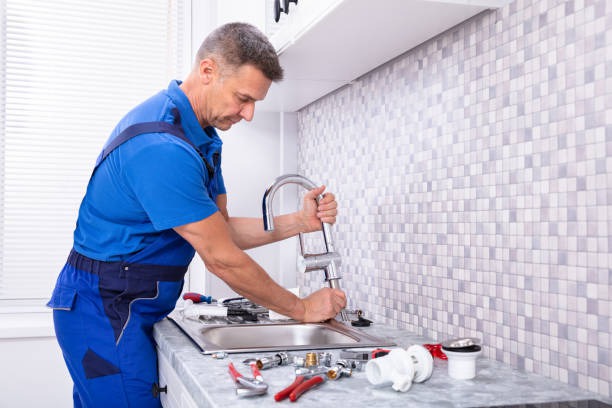Avoiding Common Plumbing Mistakes in Home Renovations
Planning a home renovation is both exciting and daunting. While it’s thrilling to imagine your new space, the process itself involves countless decisions and potential pitfalls. Plumbing, a critical aspect of any renovation, often gets overshadowed by more visible elements like design and decor. However, overlooking plumbing details can lead to costly errors. By the end of this guide, you’ll be well-equipped to avoid common plumbing mistakes that could otherwise turn your renovation dream into a nightmare.
Why Is a Well-Planned Plumbing System Crucial
Before embarking on any construction or renovation project, it’s crucial to understand your home’s plumbing system. Water needs to flow efficiently to and from your house, and minor oversights can disrupt this flow, causing significant issues. Ensure you have detailed blueprints or an expert evaluation of your current plumbing layout before making any changes.
Common Plumbing Mistakes in Home Renovations
Renovating a home means making numerous decisions quickly. Amidst all the hustle, being cautious about these common plumbing errors can save you a lot of hassle down the road.
1. Overlooking Permit Requirements
Always start by checking with your local building authority about necessary permits. Certain plumbing modifications may require permissions for legal compliance. Skipping this step or ignoring permit requirements can cause legal complications and even necessitate undoing finished work.
2. Misjudging the Pipe Sizes
It’s easy to misjudge the size of pipes required for your renovation. Using wrong-sized pipes, especially in drainage or water supply systems, can lead to slow drains, leaks, and even burst pipes. Always match the piping to the size of your infrastructure requirements, or consult a professional to ensure you have it right.
3. Using Low-Quality Materials
While it may be tempting to cut costs with cheaper materials, low-quality plumbing fixtures and accessories can cost you more in the long term. Invest in quality items, which are often more durable, saving you money on replacements and repairs.
4. Poor Pipe Connections
Poorly connected pipes can lead to leaks or water pressure issues. Using the correct connectors and employing proper techniques are paramount for secure and seamless pipe connections. When in doubt, always call a professional to handle the nuances of pipe connections.
Trusting Professionals for Your Plumbing Needs
While DIY projects can be tempting, trusting professionals can often save time, money, and stress. Consulting a professional plumber in Norwalk can ensure your plumbing is installed accurately and efficiently, significantly reducing the risk of common home renovation mishaps.
Planning Future Maintenance During Renovations
Thinking long-term can help prevent future issues. As you update your plumbing, consider planning maintenance tasks. Install access panels for hard-to-reach valves or fixtures to make future repairs easier, reducing labor costs and time during any repairs down the line.
5. Ignoring Venting Requirements
Vents are crucial in a plumbing system to allow sewer gases to escape and maintain pressure balance. Failing to incorporate proper venting can lead to slow drainage and unpleasant odors. Make sure every fixture in your home renovation plan has adequate venting.
How to Ensure Adequate Venting
-
Consult your local building codes for venting requirements
-
Ensure that every plumbing fixture is vented properly
-
Install air admittance valves if traditional venting is not feasible
Choosing the Right Fixtures for Your Space
Fixtures such as sinks, toilets, and showers come in various sizes and shapes. They need to fit well within their designated spaces. Inadequate spacing can create a cramped feel and functional issues. Always measure your spaces accurately before purchasing fixtures.
6. Forgetting About Accessibility
Ignoring accessibility could be a mistake if you plan to age in place or serve a diverse family’s needs. Ensuring your bathroom and kitchen areas are accessible can be a major plus and even increase the value of your home. Consider installing faucets, showerheads, and toilets designed with universal access in mind.
Adequate Plumbing for Increased Water Usage
Upgrading room size or adding amenities can increase water consumption. Ensure your plumbing system can handle additional water usage. Failure to adjust your plumbing can result in water shortages, noise, and extra wear on your system, leading to premature failure.
Learning from Mistakes to Prevent Mishaps
Even the best-laid plans can go awry. One effective way to prepare is by learning from common renovation pitfalls others have faced. Speaking with a knowledgeable community member or seeking insight from this plumber could provide valuable lessons to apply during your renovation project.
7. Inadequate Water Pressure Assessment
Before upgrading or adding new fixtures, assess your existing water pressure. Insufficient water pressure can lead to unsatisfactory performance of showers, appliances, and faucets. Install pressure-boosting pumps if necessary to ensure optimal performance across your home.
8. Neglecting to Install Shut-Off Valves
Installing shut-off valves during plumbing installations or upgrades can save substantial time and hassle in case of a leak or failure. They allow specific areas of your plumbing to be isolated without interrupting the entire system. This practice is especially beneficial in reducing risk if you encounter a plumbing emergency in Norwalk.
Collaborating with Skilled Professionals
Plumbing is complex, and even seasoned DIY enthusiasts can benefit from collaborating with experts. A plumber with extensive experience will quickly spot potential issues and provide solutions, ensuring your renovation is smooth and hassle-free.
9. Overextending Your Budget
A well-planned budget is imperative when embarking on a renovation. Plumbing can be unpredictable, sometimes requiring more than initially anticipated. Always leave a buffer in your budget for unexpected expenses to prevent financial strain.
Final Thoughts
Your home renovation project can be an enriching experience, but it requires careful consideration of various elements, including plumbing. By being aware of common pitfalls and preparing accordingly, you can achieve a seamless renovation that effectively meets your home’s plumbing needs. Trust in craftspeople, plan thoughtfully and remember that asking for help is often the best way forward. With the right approach and expert guidance, your newly renovated space will serve your household efficiently for years to come.


